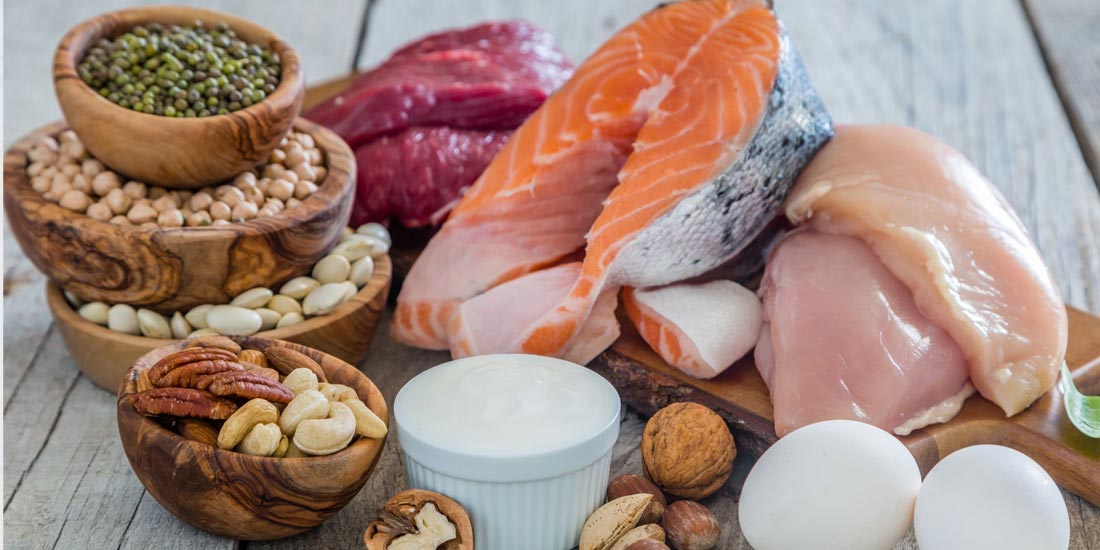

Although protein deficiency is not a common concern in Western society today, for some groups of women, protein intake may be too low to keep up with the body’s needs.
Some women who are vegan, vegetarian, pregnant or train a lot, may not meet their protein requirements, and some women are just afraid to consume too much protein, as they think it will make them bulky and manly (this is a topic for another article!). So, exploring the signs and symptoms of protein deficiency can be a good idea!
1. Fatty Liver and High Body Fat Percentage
Low protein intake can correlate with non-alcohol induced fatty liver disease. Although the reason for the correlation is somewhat unknown, it is suspected that inadequate fat-transporting proteins (lipoproteins) may be responsible for allowing a build-up of fat in the liver, when it should be transported out around the body.
Another consideration, is that of people consuming far too much carbohydrate, sugar or fat in their diet if they are eating low protein. This is often because, unless people are purposefully trying to calorie restrict anyway, if protein intake is low, cravings for foods and overall appetite will increase. Therefore, people will ‘fill up’ on carbohydrate or fats, which can lead to overeating and fat storage. A study showed that those who ate the same amount of calories as lollies instead of peanuts gained fat. The peanut group, despite having the same excess calories, did not gain weight. So, once again, what you eat is much more important than how many calories you’re eating.
2. Hair, Skin and Nails
Because protein is so crucial to the structure and health of our hair, skin and nails, if we are deficient, you may notice brittle hair or nails, and flaky, depigmented skin. Other symptoms could include alopecia, faded hair colour, or red, sore skin. These are common only in severe protein deficiency, but it is good to be aware.
3. Loss of Muscle Mass and Reduced Metabolic Rate
Because your muscle mass is the largest ‘reserve’ of protein in your body, if your dietary protein intake is too low, your body with break down (catabolise) muscle to retrieve stored amino acids (protein building blocks). This can happen with age, as well as with greater physical demands, such as excess training or illness.
4. Anxiety, Depression and Irritability
Because essential amino acids are so crucial for mood and neurotransmitter (brain chemicals) formation, if adequate essential amino acids are not consumed regularly, your body will start to show signs of deficiency, which may include mood and behavioural problems. Tryptophan, Tyrosine, Glutamine and Taurine are four important amino acids to consider. Consult a trained Nutritional physician to ensure you are getting adequate amino acid intake if you have any mental health concerns.
5. Insomnia or Sleep Disturbance
Following on from above, amino acids are also crucial for promoting a relaxed state, and good quality sleep. This is heavily dependent on GABA, Glycine, Adenosine and Tryptophan, as well as stable blood sugar levels. GABA, Glycine and Adenosine all play a role in neuro-relaxation, which ensures an ability to ‘switch off’, feel sleepy, and create the onset of sleep, while maintaining deep sleep. Melatonin is also the king of sleep regulation.
The essential amino acid, Tryptophan, which we need to consume from dietary protein sources, is converted to serotonin, which is then converted to melatonin based on your circadian rhythm and natural light cycles. If there is inadequate tryptophan, or ability to convert, low melatonin levels will cause sleep disturbances.
As a side note: stress and high cortisol/adrenaline levels also directly interfere with melatonin production, and blue light from screens and some lighting can interfere, also. So, it is best to turn screens off, get blue light-filter glasses, and dim your lights as 8pm approaches and melatonin starts to rise. This will help your brain to more efficiently produce adequate melatonin to see you sleeping deeply through the night.
Think you may be protein deficient? Take a look at any of the casein or whey protein supplements we have available on our store. If you don't see one you like or have questions about what we do stock, feel free to email or give us a call at any of our friendly branches, nation-wide!










